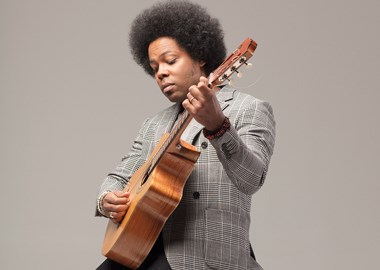Alex Cuba, Grosvenor Theatre, Kay Meek Centre, Friday, Nov. 17, 7:30 p.m. kaymeek.com.
Alex Cuba’s new album is probably his most mature record to date, even though he drew inspiration for it by channeling his youthful roots back home.
The 43-year-old singer, songwriter and entertainer, who was born Alexis Puentes, is currently in the midst of a 12-date tour to promote Lo Único Constante, his sixth solo album.
The record was recently nominated for a Latin Grammy Award for Best Singer/Songwriter Album.
The album cover, which features a washed-out picture of him playing the guitar, conveys something of the record’s retro vibe, according to Cuba.
“I think it goes with the feel of the music. … It has a classic sort of feel to it. We wanted to honour that,” he tells the North Shore News while on tour in Canmore, Alta.
Cuba lives in Smithers, B.C. with his wife and three kids but he’s originally from Artemisa, Cuba.
The multi-Juno and Latin Grammy winning musician says that on Lo Único Constante, which translates to “The Only Constant,” he was largely channeling Filin music, a musical and popular song movement in Cuba that flourished in the country during the 1940s, ’50s and ’60s.
“I was exposed to that through my father. He used to play it so much, or play music from that era, around the house. It left a big impression on me,” he says. “When I was creating this album I felt a connection there to the songs that I had with that sort of style or movement.”
Filin music, or “feeling” music, in the ’40s was partly inspired by the wave of jazz swingers and crooners in the U.S. that dominated the pop landscape – think of singers such as Ella Fitzgerald, Nat King Cole, or even Frank Sinatra.
While American jazz at the time largely featured lush orchestral arrangements, the Cuban version – the one that became Filin music – featured the soft, attractive vocal lines of its U.S. counterparts paired alongside the subtlety of something as simple as an acoustic guitar.
That stripped down, acoustic sensibility was one of the driving forces behind Cuba’s new album, he says.
“I recognized very early that the songs will sound best in a more acoustic universe,” he explains. “I think that that movement in a way has a lot to do with my identity as a musician. Since I started recording my albums they all come out with a classic sort of feel to it. It’s something that I can’t run away from.”
Cuba’s father was a guitar teacher and the young, budding singer learned the instrument at an early age. At 14, he took up the bass and when he was 23 years old he moved to Victoria, B.C. after marrying a Canadian woman.
While trying to find gigs in Victoria, the young Cuba, partly in jest, hung a sign around himself that read: “New hot Cuban bass player in town.”
Years later he moved to Smithers, where his wife’s family is originally from, and launched a solo career in 2004.
“I knew it was going to be maybe difficult to pursued a music career from a small town … but I became more focused on what I wanted to do,” he says.
Since then, his output has flourished. He has released a string of solo albums and continues to tour widely.
But it’s in his adopted Canadian homeland where his popularity has surged the most.
In June, Cuba was invited to travel with the Canada C3 vessel, a ship that travelled the country along the Northwest Passage as part of a Canada 150 celebration. A cadre of thinkers, scientists, adventurers, First Nations elders, artists, and others were invited aboard to share their unique perspectives.
“It was amazing,” he says. “At the beginning I was unsure about it. I didn’t see why I should be part of it, but then I read about it and it became interesting to me.”
He says that he was most interested in learning about truth and reconciliation aboard the vessel, a constant theme as the travellers sailed across Canada and visited those affected by the country’s unfortunate colonial legacy, among other stops throughout the nation.
His desire to grow as an artist is another major theme present on Cuba’s latest offering. Asked what the album’s title means, his answer is immediate: “The only constant in the universe is change.”



